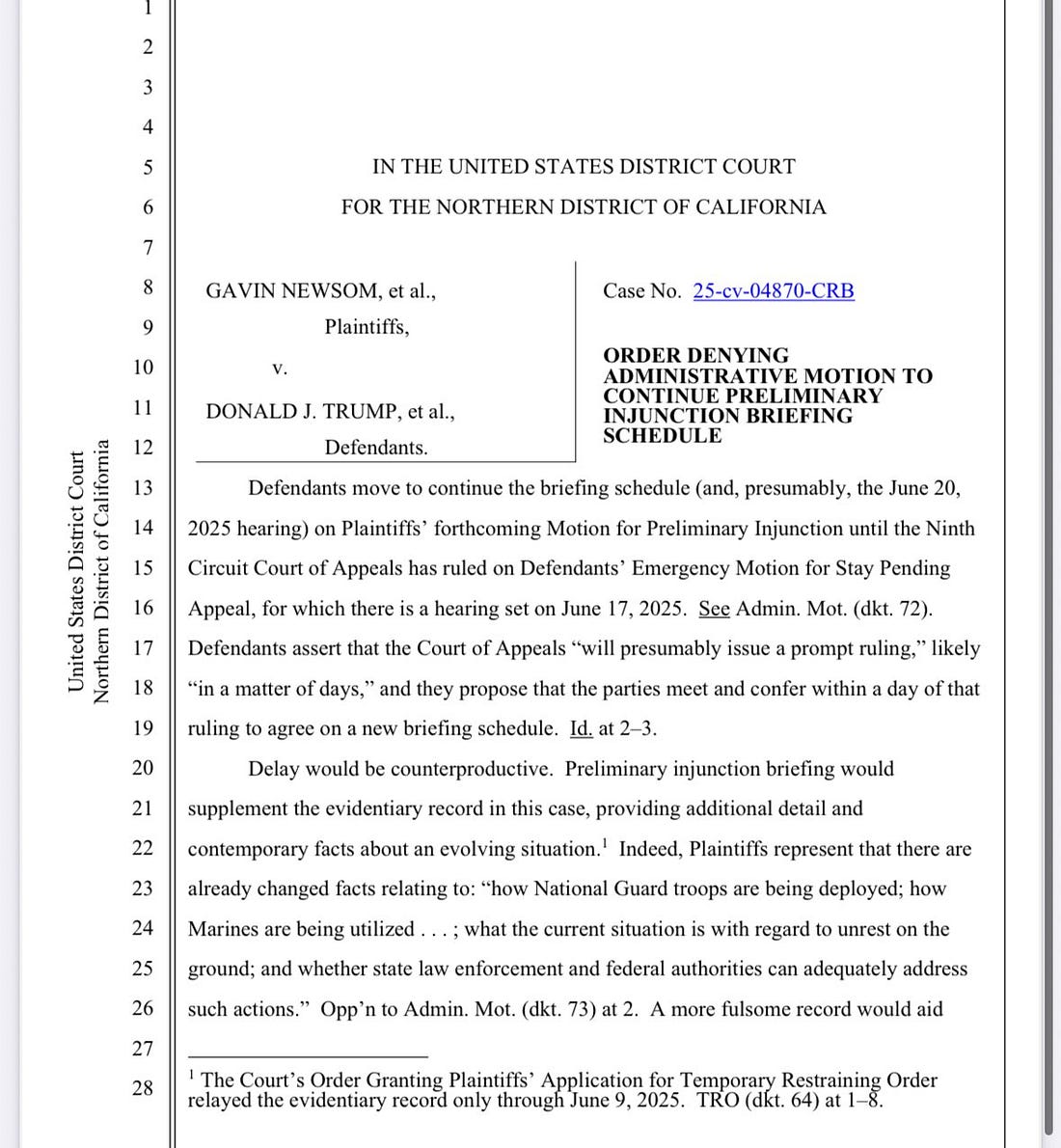|
 |
I didn’t get a response. On Thursday, after California Senator Alex Padilla was all-but-arrested for asking a question at a cabinet secretary’s press conference and after Washington Senator Patty Murray’s moving speech on the floor of that Senate (that I reprinted for you that night), after the video emerged, after it was clear Padilla identified himself as a United States senator before law-enforcement hustled him to the ground and handcuffed him with his arms tight behind him, I reached out to my senators. I wanted to know what they thought.
We really shouldn’t have to detail the reasons senators should be appalled and outraged by this administration’s treatment of members of a coequal branch of government. But we probably have to. We have to because people like Glenn Beck called the incident “political theater” by the Democrats. On Reddit, a popular thread, although informational, recited that “Mr. Padilla was told repeatedly to back away and did not comply with officers’ repeated commands. u/SecretService thought he was an attacker and officers acted appropriately.” Of course, someone identifying himself as the United States senator for the state the secretary is in and saying he has a question for her is only a threat in a mindset where all brown-skinned people have become a threat. What happened to Senator Padilla was shocking, and the absence of outrage from Republican senators, let alone the call for Padilla to be censured, only underlines how far the country is sliding into Trumpism.
So, I reached out to my senators that night. I had press contact info for Tommy Tuberville and used that, explaining I’m a constituent and I also write this newsletter. For Katie Britt, I used the contact form for constituents, explaining that I was also looking for responses that couldn’t be printed.
I’m sure you’ll be shocked to learn I didn’t hear back and still haven’t. Maybe it’s in the works. Maybe they’re too busy to get to me just yet. And of course I’ll try again. I’ll try a couple more times.
But there’s a rule that applies to the discovery phase of a civil lawsuit—in federal cases, it’s found in Rule 37 of the Federal Rules of Civil Procedure—that needs to be used here as well. In civil cases, there is a robust “discovery” stage, where parties ask for and receive information from the other side. We’re familiar with this from the many cases where Trump has delayed, complained, and flat-out refused to comply during this process. Rule 37 provides that when a party fails to respond, the court can take the “designated facts … as established for purposes of the action.” I can’t think of any reason that rule doesn’t apply here as well. If a senator, or any elected representative, has the opportunity to explain their side of a matter to constituents and they fail to do so, ignoring them, then it seems like it’s fair game to assume it’s because they don’t have a good response to make, one we couldn’t rip to shreds. Because, after all, who can really defend what was done to Senator Padilla last week?
When I don’t hear from a United States senator, and specifically my United States senators, on an issue of this level of importance, I think I’m entitled to draw the inference that their answer would be a big zero. Nothing. No outrage, no willingness to stand up to Donald Trump and his administration on this incident, or frankly on any other, and call him out. Because they’re scared, because they’re toadies, because they want to keep their jobs and not have primary opposition stirred up by the leader of their party. Accountability still has to mean something in this country, and we have to hold these people accountable.
So yes, I’ll try again. I hope you’re trying too. But let’s make sure our senators know—I plan to tell mine explicitly the next time I write that I will be drawing an inference against them if I don’t get a response. Because enough is enough. And actually, they work for me. Not the other way around. They aren’t entitled to those jobs. It’s time to remind them of that fact.
Senators stand for reelection once every six years. A third of them will be up in 2026. It’s never too early to get a good candidate in the works, either a primary opponent or an opponent from the other party. Maybe they do their jobs better if they’re afraid of opposition. Right now, they’re afraid of Trump. But they don’t work for him or at his pleasure. Senate races, unlike the ones for seats in the House, aren’t vulnerable to gerrymandering because senators are elected statewide. It’s time to make sure our senators understand that, and if they lack the courage to speak up for the institution in which they serve, it’s time for their tenure there to come to an end.
In addition to keeping an eye on our employees in Washington, D.C., we have several legal matters to attend to in the week ahead. First, in California, where understanding the future of Judge Breyer’s decision requires us to do a little arcane civil procedure work. You will recall that the Trump administration immediately appealed Judge Breyer’s decision that Trump exceeded his authority when he federalized the National Guard. Normally, an appeal terminates the district judge’s jurisdiction to continue to work on the case until the appeal is over. But not here, says Judge Breyer.
His reasoning, which is quite sound, is that the Trump administration filed an emergency motion, asking the Ninth Circuit to keep Judge Breyer’s order that the Guard be restored to the Governor from becoming effective while they appealed him. There is a hearing set on that matter for Tuesday. The Trump administration has asked the Judge to wait and see what they do before moving forward in the case, a reference to his scheduled hearing on Friday to consider whether he should convert the temporary restraining order (TRO) he’s issued, which Trump is annoyed about, into a preliminary injunction that would stay in effect for the entire pendency of the case in front of Judge Breyer—in other words, keeping the guard out of Trump’s control, at least on this basis, for however long the case takes. “Delay would be counterproductive,” Judge Breyer wrote in an order on Saturday.
He pointed out that having the parties file briefs will expand the evidence available to the court and will allow them to update the facts before the court, since the situation is in flux right now. “A more fulsome record would aid both this Court in assessing the proprietary [sic] and scope of any preliminary injunctive relief, as well as the Court of Appeals, if and when it undertakes review of this Court’s findings.”
The “if and when” is included because the Trump administration has appealed the temporary restraining order to the Ninth Circuit, and TROs are not typically appealable. In normal times, one might have expected a quick dismissal of the matter noting that, but these are not normal times. Trump wants the court to treat Judge Breyer’s decision like it is already a preliminary injunction (the matter he is considering on Friday); in other words, he wants special rules to apply to him, again. The practical impact of the Ninth Circuit’s administrative stay while they consider the matter is that Trump remains in control of the National Guard troops he federalized until that court says otherwise.
If you’ve stuck with me through the legal arcana, you’ve made it through the most difficult part, but there is more:
This is also a week when we can expect to see multiple decisions from the Supreme Court. The Court should have been the primary focus of the week as they begin to wind down for this term, but it seems to have become almost an afterthought in the middle of everything else. We are still waiting on some highly significant cases, including the birthright citizenship case, which involves the validity of nationwide injunctions, and Skremetti, the case about medical care for transgender minors, among others. There are also cases pending on the Court’s shadow docket that will impact Trump’s ability to accumulate more power.
As of Sunday evening when I’m writing, there is still a manhunt on for the murderer of Minnesota lawmaker Melissa Hortman and her husband Mark. He also shot lawmaker John Hoffman and his wife, Yvette. We will undoubtedly be following that situation this week. In addition to the importance of arresting him so he is no longer a threat, it will be especially important to learn more about his motives. Is he a lone wolf or is this a movement?
We enter the week ahead with a renewed understanding of the importance of being a citizen in this country and our power. Remember when “they” said democracy wasn’t an issue and that Democrats should run on kitchen table issues? It turns out, democracy actually is an issue. And the protests yesterday proved that. Almost 2% of Americans turned out for the No Kings protests.
We need to keep that energy going. Don’t normalize this moment. None of it. A senator, handcuffed for asking questions. A congresswoman indicted. Marines detaining citizens on American streets. A cabinet secretary calling for the liberation of Americans from their duly elected leaders. A judge indicted in a highly speculative case that looks more like a threat than justice. Other judges condemned for making decisions in cases that are in front of them. And all of it, all of it, designed to intimidate us so we will be afraid to exercise our rights.
On Saturday, two million of us protested in the streets. We aren’t done. Yesterday was the beginning. There are elections coming, and yes, I’m going to tell you yet again that the next election will be the most important one of your life. This time, we all get that. But it is a long time before we get there, and in the meantime, we have to stay alert and focused on protecting democracy like we were yesterday. If we normalize what’s happening today, Trump will move on and do more tomorrow.
We’re in this together,
Joyce

